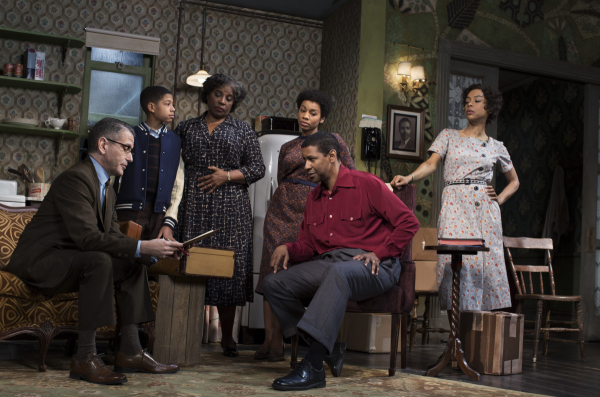A Raisin in the Sun

(© Brigitte Lacombe)
"I am a giant surrounded by ants!" Walter Lee desperately bellows at the top of Act 2, screaming for the respect and authority of which (as of yet) he is wholly undeserving. Since Sidney Poitier put his stamp on the role in 1960, this overgrown child of a character in Lorraine Hansberry's masterpiece A Raisin in the Sun has become prime real estate for blinding stars to inhabit.
Kenny Leon, who directed Sean "Puff Daddy" Combs in the 2004 revival, returns a decade later to take a second swing at the play — this time bringing out the heavy artillery with his larger-than-life leading man, Denzel Washington. Unlike Combs, who christened his stage career in front of Broadway critics, acting chops are never in question with this Oscar-winning superstar, whose last Broadway appearance, in August Wilson's Fences, earned him a 2010 Tony Award. A giant of both stage and screen, the only danger Washington poses is that of unironically becoming the giant that Walter Lee so fancies himself, leaving a cast of squashed ants in his wake.
Luckily, there is not an ant to be found among this brilliant ensemble. Nor does Washington flaunt his theatrical prowess (or his celebrity) with a soul-spillingly dramatic performance — something his audience of devout fans would be hard-pressed not to devour like an ice cream sundae on a summer rush line. He instead paints a subtle picture of a frenetic child ready to jump out of his skin — powerful enough to command our attention but not so present as to make us forget the tragically subordinate role he takes in his own family. Leon fuels the production with the purified energy of an honest-to-goodness ensemble, staying true to the poetically unremarkable African-American family Hansberry set out to capture.
Set designer Mark Thompson has crafted a cramped, rundown yet well-kept Chicago apartment, held together by the proud members of the Younger family. It slowly moves toward the front of the stage as if a giant magnifying glass were held up to the audience's collective eye, prepping it for a close examination of the mechanism that keeps this family running. That mechanism is, first and foremost, matriarch Lena Younger, played by the superb LaTanya Richardson Jackson, silently claiming her domain over the household as she awaits the arrival of a $10,000 insurance check following her husband's passing — a life-changing amount of money that, if each family member had his or her druthers, would be put toward the pursuit of vastly different dreams.
Lena rules the household with a sharp tongue and stinging palm as mother to Walter Lee, Jr. (Washington), an immature and deeply dissatisfied chauffeur who lobbies for money to invest in a liquor store, and her younger daughter, Beneatha, an aspiring medical school student whose views on religion, gender, and race would be controversial even in some circles today. Anika Noni Rose gives Beneatha's character plenty of foibles, portraying her with a discernible naïveté, yet thankfully leaving behind the unsavory brattiness that the character often totes along. True, the age discrepancies abound — particularly among this trio — but it's best to leave the calculators at home and suspend whatever minimal amount of disbelief for which Ann Roth's understated costumes or Mia M. Neal's timely hairstyles haven't already compensated.
Even beside Washington with his naturally imposing stage presence, Jackson (who joined the production as a relatively last-minute replacement for Diahann Carroll) is the indisputable captain of the ship, making you reconsider who the eye of this family storm truly is. British actress Sophie Okonedo offers a wonderfully genuine performance in her Broadway debut as Walter Lee's wife, Ruth. She appears frail and fatigued from life's continuous struggles, though her performance remains powerful and evenly matched with her onstage spouse. Okonedo effortlessly maneuvers through peaks and valleys of joy and despair, her will wearing thin as her home and marriage crumble around her.
The Youngers (rounded out by the charming Bryce Clyde Jenkins as Travis, Walter Lee and Ruth's young son) are joined by a host of supporting characters, all of whom make the most of their stage time. Jason Dirden is perfectly infuriating as Beneatha's superficial suitor, George Murchison. David Cromer plays a bashfully despicable Karl Lindner — the physical embodiment of the appalling ideology that to this day maintains the rift between races. And Stephen McKinley Henderson grabs on with both hands for his brief yet potent scene as Walter Lee's fellow investor and friend, Bobo, whose short appearance is responsible for turning the tide of the entire play. Sean Patrick Thomas, in his Broadway debut, also offers a strong performance as Joseph Asagai, a Nigerian native who brings to the forefront of Beneatha's questioning mind the cultural chasm between Africans and African-Americans.
Despite this web of family drama and profound social issues that Hansberry has packed both deftly and densely into three robust acts (though this production is presented as two acts), Leon has refreshingly directed the play with a minimally earnest hand. He ratchets up the humor, forgoing an unrelenting torrent of melodrama for a few carefully selected moments of crushing weight. You don't just root for the Youngers to find happier days — you genuinely like them and cheer for Walter when he finally tucks in his shirt and takes his first steps into manhood.










